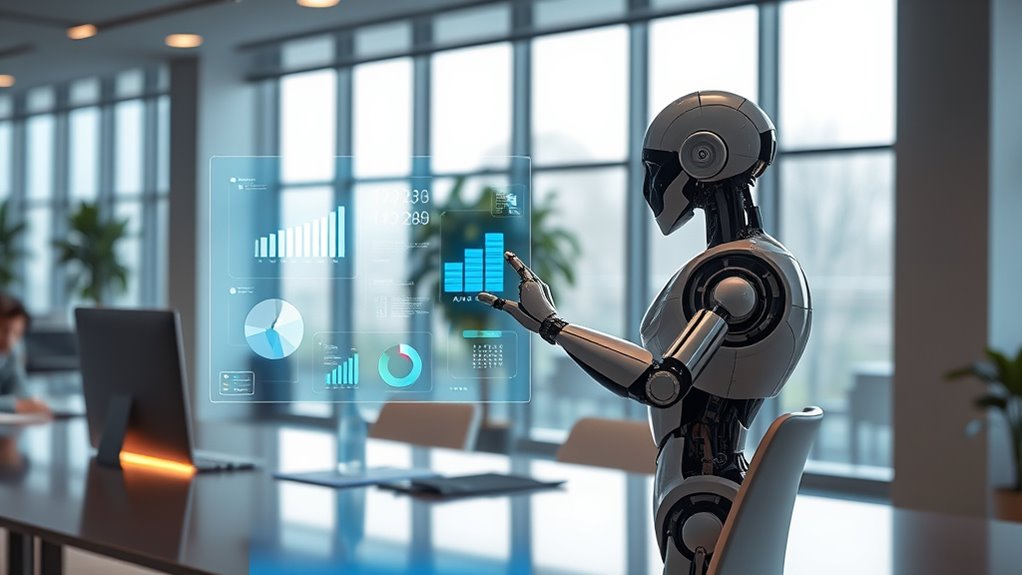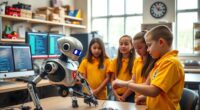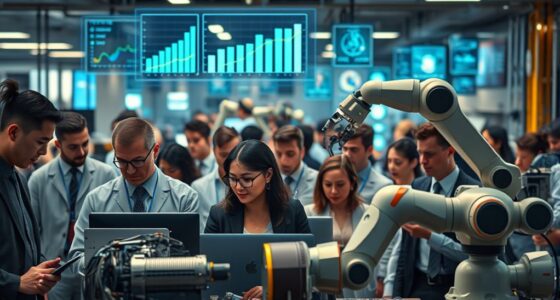AI is becoming your new coworker by actively supporting your tasks and improving how your team collaborates. It automates routine work like scheduling, data analysis, and report generation, freeing you to focus on strategic and creative efforts. AI constantly learns from your workflows, offering helpful insights and flagging potential issues early. This shift creates a more dynamic, efficient workplace where human ingenuity partners seamlessly with machine intelligence. Keep going to see how this partnership can transform your work environment.
Key Takeaways
- AI acts as a collaborative coworker by handling routine tasks and providing strategic insights.
- It proactively analyzes data to forecast trends and suggest improvements, supporting decision-making.
- AI learns and adapts to individual workflows, prioritizing tasks and managing schedules automatically.
- Integration of AI enhances real-time communication and collaboration across teams.
- AI fosters a workplace environment where human creativity partners with machine efficiency for innovation.

As artificial intelligence becomes more integrated into workplaces, it’s clear that AI is no longer just a tool but a new coworker reshaping how tasks get done. You might have already seen AI-powered systems handling customer service queries, sorting through data, or managing schedules. This shift toward workplace automation means AI isn’t just assisting—it’s collaborating directly with you and your team. Instead of replacing human workers, AI integration streamlines processes, allowing you to focus on more strategic, creative, or complex work that requires human insight. By automating routine tasks, AI reduces errors and speeds up workflows, making your job easier and more efficient.
AI is now a collaborative coworker, streamlining tasks and enhancing human creativity in the workplace.
You’ll notice that AI’s role in the workplace is becoming more proactive. For example, intelligent algorithms can analyze sales data to forecast trends, suggest inventory adjustments, or even generate reports. This form of workplace automation eliminates the need for manual data entry, freeing you from tedious chores and enabling you to devote your energy to decision-making and innovation. As AI systems become more sophisticated, they increasingly understand the context of your work, offering insights that often go unnoticed in traditional processes. This seamless AI integration helps teams collaborate more effectively, as everyone can access real-time data and insights without delays or miscommunications.
In a practical sense, AI acts as a digital teammate, constantly learning and adapting to your workflow. It can prioritize your emails, schedule meetings based on your preferences, or flag potential issues before they escalate. This proactive support enhances your productivity and reduces the cognitive load, allowing you to concentrate on tasks that truly demand your expertise. Additionally, understanding the different layer concepts involved in AI deployment can help organizations optimize their systems for better performance. With workplace automation, you might find that your organization is shifting towards a more agile environment, where AI handles repetitive routines and humans focus on strategic growth. This collaboration fosters a more dynamic workplace, where human ingenuity and AI efficiency go hand in hand.
Ultimately, AI integration is transforming the workplace landscape, making it more responsive and intelligent. You’re not just working alongside AI; you’re working WITH it. As AI continues to evolve, it will become an even more integral part of your daily operations, helping you achieve goals faster and more accurately. Embracing this change means recognizing AI as a partner—one that can enhance your skills, support your workload, and open new opportunities for innovation and growth. The future of work is collaborative, and AI is leading the way as your new coworker.
Frequently Asked Questions
How Do Employees Adapt to Collaborating With AI Colleagues?
You adapt by embracing AI as a teammate, not a threat. While trust building takes time, actively engaging with AI tools helps you see their value. Focus on skill development to work efficiently alongside AI, learning new processes and techniques. This collaboration boosts your confidence and productivity, transforming the way you work. By staying open-minded and proactive, you turn AI into a valuable partner rather than an obstacle.
What Are the Privacy Concerns With AI in the Workplace?
You should be aware of privacy concerns with AI in the workplace, especially regarding data security and employee monitoring. AI systems often collect and analyze sensitive data, raising risks of data breaches. Additionally, AI-powered monitoring tools might track your activities, potentially infringing on your privacy. To protect yourself, stay informed about your company’s data policies and advocate for transparent AI usage that respects employee privacy rights.
How Does AI Handle Complex or Ambiguous Tasks?
AI handles complex or ambiguous tasks by leveraging contextual understanding to interpret subtle nuances and incomplete information. It uses advanced algorithms to analyze patterns, resolve ambiguity, and adapt its responses accordingly. You’ll find that AI improves its accuracy over time through machine learning, enabling it to better manage difficult situations. While it’s not perfect, AI’s ability to resolve ambiguity and understand context makes it a valuable collaborator in tackling complex challenges.
What Skills Are Essential for Workers in Ai-Integrated Environments?
A stitch in time saves nine, so you need crucial skills to thrive in AI-integrated workplaces. Focus on developing emotional intelligence, which helps you connect with colleagues and understand AI’s impact. Creative problem solving is essential for adapting to new tools and challenges. By combining technical knowledge with empathy and innovation, you’ll stay valuable amid rapid AI advancements. Keep learning and stay flexible to succeed in this evolving environment.
How Is Ai’s Decision-Making Transparency Ensured for Team Trust?
You can guarantee AI’s decision-making transparency by advocating for strong algorithmic accountability, which makes the decision process clear and understandable. When teams prioritize decision transparency, everyone understands how AI reaches conclusions, building trust. Regularly reviewing AI algorithms and involving diverse perspectives help identify biases and improve clarity. This approach fosters confidence in AI’s role in your workplace, ensuring decisions are fair, explainable, and aligned with your team’s values.
Conclusion
As AI becomes your new coworker, you might wonder if it’ll ever truly replace human creativity and empathy. The truth is, AI isn’t here to take over but to collaborate with you, boosting productivity and freeing you up for more meaningful work. So, are you ready to embrace this partnership and see how AI can help you shine in your role? The future of work is already here—are you prepared to thrive in it?









